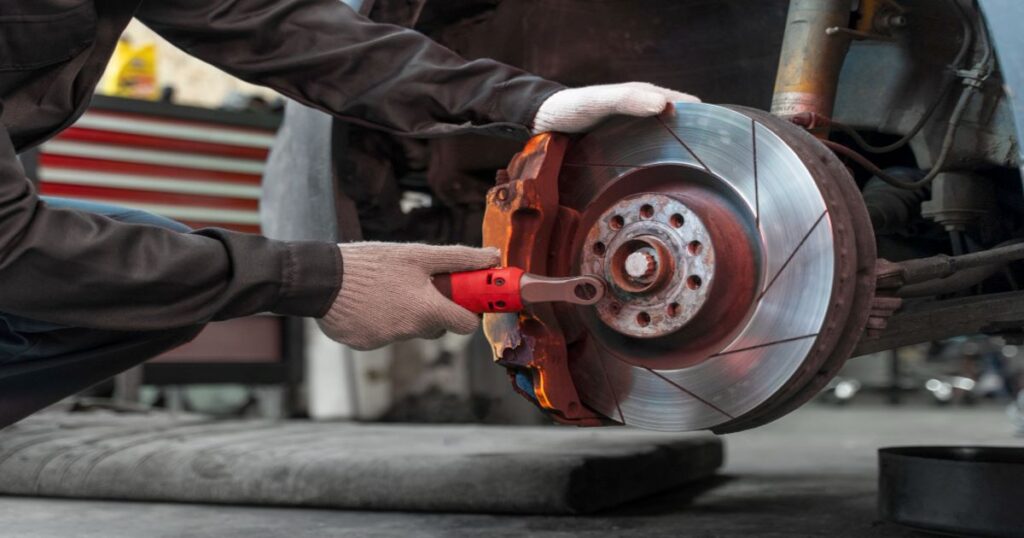Driving can be a pleasant experience but when your car starts making strange noises, it’s not so much fun. One of the common car issues drivers face is a worn wheel bearing. It can make driving an unpleasant experience. In this post, you will get to know about some bad wheel-bearing symptoms. By understanding all symptoms, whenever you recognize a sign of bad wheel bearing, you can immediately take your car to a professional to get the wheel bearing repaired or replaced and ensure your safety down the road.
Let’s get started.
What is a Wheel Bearing?
A wheel bearing is a small metal ball that sits within the suspension components of a vehicle. It helps to support the weight placed upon the wheels and allows them to rotate freely. Wheel bearings are essential for keeping noise, friction, and vibrations at bay while you’re driving. They will eventually start to wear out over time and need replacing or maintenance in order to keep your vehicle running smoothly. Regularly checking on your wheel bearings will help ensure your car runs safe and sound on the roads!
How Does a Wheel Bearing Work?
A wheel bearing is an essential part of a car, allowing its wheels to spin freely. It consists of steel ball bearings sealed within hardened steel rings, known as races. As the wheel spins, friction between the ball bearings and races is reduced by lubrication and force applied by the spinning hub. This creates a smooth operation of the wheel, ensuring a comfortable and safe ride for passengers.
What Happens When a Wheel Bearings Goes Out / Get Fail?
These are the most common questions we are receiving at TMG. If your car’s wheel bearing goes bad, it may result in various hazardous conditions mentioned below:
- You may lose control of your vehicle because the wheel bearing keeps your vehicle’s hub assembly and wheel spinning on the axis.
- In rare extreme conditions, it may happen that your wheel came out!
So, the best thing is; that if you find any symptoms of bad wheel bearings in your car, it is advisable to see the mechanic at the earliest.
7 Symptoms of Bad Wheel Bearings
Wheel bearings are an essential part of any vehicle that will sustain your vehicle’s performance and safety. Keep your car running smoothly with our helpful advice and tips. Check out these telltale signs of bad wheel bearings:
1. Unusual Wear in Tire
Unusual tire wear is an issue that no car owner wants to deal with. Unfortunately, it’s something that many have experienced at some point in their car’s lifetime. This can be anything from feathering, cupping, or general scuffing across one area of the tire. Not only does this leave tires looking old and worn after a short amount of time, but it can also be a symptom of a greater problem such as a bad wheel bearing.
How to Fix: To diagnose and fix this issue take your car to a trusted repair shop for inspection. Ignoring the issue could end up getting worse and costing more in the form of damaged tires or other car parts down the line.
2. Annoying Squealing or Growling Sound
If you have experienced the sound of squealing or growling coming from underneath your vehicle. This can be indicative of a bad wheel bearing. The noise usually comes when the vehicle gets started or you turn the steering wheel.
How to Fix: Replacing your wheel bearings should be done by a professional to ensure the work is done safely and correctly. If you’re hearing squealing or growling from underneath your hood, it’s time to take your car into the shop for servicing – getting it fixed will save you more than money down the road.
3. Humming Noise

This is another front wheel bearing noise symptom. If the noise persists, it may lead to your car losing stability. This issue is more likely to happen in cars with big powerful engines, but all vehicles can potentially have this problem.
How to Fix: Take your vehicle to a professional automotive technician as soon as possible. Prompt action would save you from causing vehicle damages due to having bad wheel bearings and costly replacement parts that come along with them.
4. Vehicle Pulls to a Particular Direction
Having your vehicle pull to one side of the road is not only annoying but dangerous. If you’re experiencing this issue, it could be due to an underlying problem with your wheel bearing. Eventually, it leads to a host of issues including wheel vibration, trouble turning, instability while braking or accelerating, etc.
How to Fix: In order to fix the issue, you’ll have to remove the wheel hub and replace the bearing assembly. You can do it by yourself with all the necessary tools at hand. However, as it requires skillful work, it is best left to a professional mechanic for safety reasons.
5. Steering Wheel Wobble
Steering wheel wobble could be more than just an annoying driving experience. It can be a sign of bad wheel bearing, caused by excessive wear or damage from a collision. If it is not repaired quickly and properly, it can lead to other problems in the suspension system and result in costly repairs for your vehicle.
How to Fix: Replace the damaged wheel bearing with a new one and realign other components in the suspension system as necessary. However, since this requires expertise, labor, and parts which can all add up quickly, you are better off finding an experienced mechanic who knows how to handle the repair specifically. That way you can keep those wheels rolling worry-free!
6. Excessive Play in the Wheels
One indication of a damaged wheel bearing is if you hear a loud humming or grinding noise when you are driving. If this noise is accompanied by additional play in the wheels then it’s likely that your wheel bearings need replacing entirely. Although replacing them can be time-consuming and expensive, the longer you wait to replace them, the more damage it can cause elsewhere on your car – so it’s best not to delay!
How to Fix: With help from video tutorials and shop manuals, you should be able to change out your old bearings for new ones yourself using special tools, or alternatively book an appointment with a local garage that will be able to carry out this task for you.
7. Problem in Anti-lock Brake System

If you find strange noises from the braking system, it can be an indication of a bad wheel bearing that needs to be replaced. Unfortunately, this isn’t something you can repair yourself. If you suspect there’s an ABS failure that could be caused by a bad bearing, don’t wait until it’s too late – visit your local garage as soon as possible to have it fixed.
How to Fix: Get your wheel bearings checked. Ignoring the problem will only make it worse and lead to more expensive repairs. Don’t wait until it’s too late, take action immediately after noticing the symptoms to avoid costly repairs later on.
Final thoughts,
Wheel bearings allow a vehicle’s wheels to run smoothly with the least friction. Thus it is vital to be aware of the warning signs of a bad wheel bearing. By keeping an eye out for these symptoms, you can avoid costly repairs or replacements down the road. Do you have any tips for maintaining healthy wheel bearings? Share them in the comments below!
FAQs
1. Is it safe to drive with a bad wheel bearing?
No, it is not safe to drive with a bad wheel bearing. Bad or damaged wheel bearings can dramatically reduce how well your car handles, resulting in poor cornering, stability, and steering response. Worse still, they can eventually fail completely while driving at high speeds leading to catastrophic failure of the entire suspension system.
2. Do wheel bearings affect brakes?
Yes, wheel bearings can have an effect on brakes. Wheel bearings help keep the wheels in place and provide support when applying braking force, so if they are worn out or damaged they won’t provide the same support and could cause issues like vibrations when braking or excessive tire wear. Worn wheel bearings can also reduce a car’s ability to stop quickly, as they won’t be able to absorb the same amount of energy from the brakes during rapid deceleration.
3. How much does it cost to replace a wheel bearing?
The cost of replacing a wheel bearing varies depending on the type of car and the level of labor required. It could also increase depending on additional work like brake pad replacement or axle shaft removal. The exact cost may be higher if special tools are needed or an alignment is required after installation.
4. How can you know which wheel bearing is bad while driving?
You can identify a bad wheel bearing if you feel a grinding or humming noise coming from one corner of your car when driving. Additionally, there may be “play” or wobble in the wheel, indicating that the wheel bearing is failing and needs to be replaced. If you are in doubt as to which wheel bearing has failed, take your car to a mechanic who can inspect it and tell you which one is faulty.

Your efforts are really appreciated, and I am grateful for the high-quality content you provided.